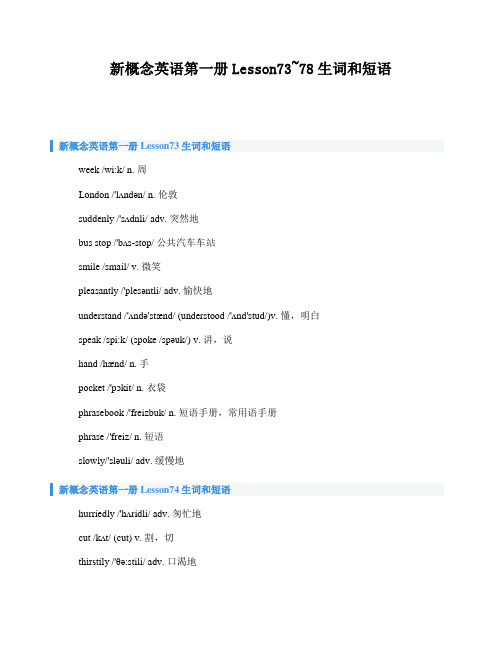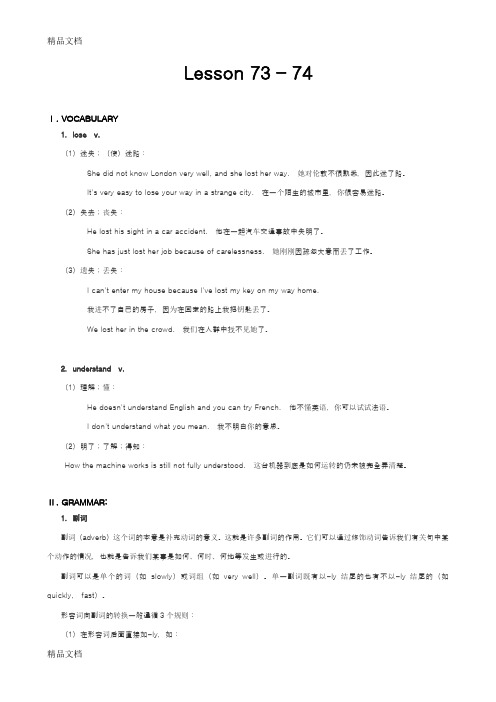新概念第一册 Lesson73
新概念英语第一册一年级上册Lesson73-78课件

1. 我能等,但我的牙痛却不能等。
I _c_a__n__ w__a_i_t__, but my toothache __c_an’_t__.
2. 我想看牙医。
I want ___t_o_______ se_e____ the dentist , please.
5. late ---- late
11. bad ---- badly
6. slow---- slowly
汉译英。
• 1. 上星期她到伦敦去了。
• __L__a_s_t_ week she _w__e_n_t__ __t_o____London.
• 2. 忽然,她在公共汽车站附近看见一个男人。
• Su_d_d_e_n__ly_ , she ___s_a_w__ a man __n__e_a_r_a bus stop .
• 1.女人总是穿不舒坦的鞋子。 • Women always wear uncomfortable shoes. • 2.你就不能等到今天下午吗? • Can't you wait till this afternoon? • 3.我想要看牙医。 • I want to see the dentist. • 4.你能下午4点来吗? • Can you come at 4p.m.?
一般过去时
Make sentences:
She I He They
• went to London • lost her way • saw a man • smiled pleasantly • spoke German • was a tourist • put his hand into his pocket • bought this pair of shoes
新概念英语第一册Lesson73_78生词和短语

新概念英语第一册Lesson73~78生词和短语新概念英语第一册Lesson73生词和短语week /wi:k/ n. 周London /'lʌndən/ n. 伦敦suddenly /'sʌdnli/ adv. 突然地bus stop /'bʌs-stop/ 公共汽车车站smile /smail/ v. 微笑pleasantly /'plesəntli/ adv. 愉快地understand /'ʌndə'stænd/ (understood /'ʌnd'stud/)v. 懂,明白speak /spi:k/ (spoke /spəuk/) v. 讲,说hand /hænd/ n. 手pocket /'pɔkit/ n. 衣袋phrasebook /'freizbuk/ n. 短语手册,常用语手册phrase /'freiz/ n. 短语slowly/'sləuli/ adv. 缓慢地新概念英语第一册Lesson74生词和短语hurriedly /'hʌridli/ adv. 匆忙地cut /kʌt/ (cut) v. 割,切thirstily /'θə:stili/ adv. 口渴地go /gəu/ (went/ went/ ) v. 走greet /gri:t/ v. 问候,打招呼新概念英语第一册Lesson75生词和短语ago /ɔ'gəu/ adv. 以前buy / bai/ (bought /bɔ:t/) v. 买pair /peə/ n. 双,对fashion /'fæʃən/ n. (服装的)流行式样uncomfortable /ʌn'kʌmfətbəl/ adj.不舒服的wear /weə/ (wore/wɔ:/) v.穿着新概念英语第一册Lesson76生词和短语appointment/ə'pɔintmənt/ n. 约会,预约urgent/'ə:dʒənt/ adj. 紧急的,急迫的till/ til/ prep. 直到……为止新概念英语第一册Lesson77生词和短语shopping /'ʃɔpiŋ/ n. 购物list /list/ n. 单子vegetable /'vedʒtəbəl/ n. 蔬菜need /ni:d/ v.需要hope /həup/ v. 希望thing /θiŋ/ n. 事情money/ 'mʌni/ n. 钱新概念英语第一册Lesson78生词和短语groceries /'grəusəriz/ n. 食品杂货fruit /fru:t/ n. 水果stationery /'steiʃənəri/ n. 文具newsagent /'nju:z'eidʒənt/ n. 报刊零售人chemist /'kemist/ n. 药剂师,化学家。
新概念英语第一册课后练习题答案:Lesson 73

新概念英语第一册课后练习题答案:Lesson 73
Lesson 73 阅读理解
答案与解析
1. C。
从文章第一句能够知道Henry 要借的是一本书。
2. B。
文章第二行说道Henry 没有看到图书管理员,而是看到一些机器人站在那里,所以能够推断
是机器人在图书馆里工作。
3. D。
通过文章第四行另一个同学的提示,能够看出如果想让机器人服务,还必须说出准确的口令
才能够。
4. A。
B、C、D 三个选项均不符合题意。
5. C。
从Hey, give me a book on music.一句可知,Henry 要借的是一本关于音乐的书籍。
英汉翻译
1. I lost my way last week.
2. I am not familiar with Shanghai.
3. A man was standing near the bus station.
4. That man took out some money from his pocket.
5. He smiled to me pleasantly.
6. Can you tell me the way to the bus station?
7. He can’t speak Chinese.
8. You can ask the police the way.。
最新新概念英语第一册-lesson73

Lesson 73 – 74Ⅰ. VOCABULARY1.lose v.(1)迷失;(使)迷路:She did not know London very well, and she lost her way. 她对伦敦不很熟悉,因此迷了路。
It's very easy to lose your way in a strange city. 在一个陌生的城市里,你很容易迷路。
(2)失去;丧失:He lost his sight in a car accident. 他在一起汽车交通事故中失明了。
She has just lost her job because of carelessness. 她刚刚因疏忽大意而丢了工作。
(3)遗失;丢失:I can't enter my house because I've lost my key on my way home.我进不了自己的房子,因为在回家的路上我把钥匙丢了。
We lost her in the crowd. 我们在人群中找不见她了。
2.understand v.(1)理解;懂:He doesn't understand English and you can try French. 他不懂英语,你可以试试法语。
I don't understand what you mean. 我不明白你的意思。
(2)明了;了解;得知:How the machine works is still not fully understood. 这台机器到底是如何运转的仍未被完全弄清楚。
Ⅱ. GRAMMAR:1.副词副词(adverb)这个词的本意是补充动词的意义。
这就是许多副词的作用。
它们可以通过修饰动词告诉我们有关句中某个动作的情况,也就是告诉我们某事是如何、何时、何地等发生或进行的。
副词可以是单个的词(如slowly)或词组(如very well)。
新概念第一册 lesson 73-74 课堂及课后练习

2016新概念第一册L e s s o n73-74课堂及课后练习(总2页)-CAL-FENGHAI.-(YICAI)-Company One1-CAL-本页仅作为文档封面,使用请直接删除新概念一L73-74课内语法考核语法练习:形容词副词1.一般情况下直接加“ly”,如quick---quickly2.以“y”结尾的,先将“y”改成“i”,再加“ly”,如happy---happily3.少数以e结尾的形容词,要去掉e再加-ly。
例如:true-truly等。
但绝大多数以e结尾的形容词仍然直接加-ly。
例如:polite-politely, wide-widely练习二1. Look at the children on the playground. They are flying kites ________(happy). Let’s join them.3. Why do you think you did so ___________(bad)in your test5. We can __________(easy) forgive a child who is afraid of the dark, but we can’t forgive an adult who is afraid of the light.6. Congratulations! You’ve answered all the questions _________(correct).7. The computer is ______(wide)used in our daily life. We can do many things with it.8. I changed into my sports shoes so that I could walk more ____________(comfortable).9. Mary passed her examination because she studied very ________(hard).10. “Why didn’t you tell me earlier” The boss sho uted _______(hungry).12. It’s ___(true) possible that robot teachers will be popular in schools some day.13. How _________(comfortable) the giant pandas are living in Taiwan!14. Miss Xu smiled and said to me ________(soft), “Never mind, my boy!”15. Last night it rained __________(heavy) in the southern part of the city.17. Simon hates to be like others, he often tires to do everything ______(different).19. The children clapped their hands _________(excited) as soon as the astronauts appearedon the stage.20. Tom had an accident yesterday. His teacher sent him to the hospital ____(quick).21. We should speak to the old man _________(polite)23. I’m _______(true) sorry I can’t go with you. I have a lot to do this afternoon.新一 L73-74 课前测试一、单词1周 2 突然地 3 愉快地 4 讲,说5 衣袋6 问候,打招呼7 匆忙地8 懂,明白9 微笑 10 公共汽车站二、词组1心中暗想 2自言自语 3把---放在哪里4迷路 5去---的路 6对---熟悉7拿出 8告诉某人去哪的路三、写出下列动词的过去式___________ ____________ ______________ _______________ ______________ _____________ ______________ _____________ ___________四、选择_______you last Sunday ---I ______in New York., was , were , were , wasoften say _______myself"I should study English well."_______a book and _______it ________Mary.out , gave---to out , gave---for out , gives---to off , gave---toenjoyed _____yesterday evening.doesn't know me very _______.______his book on the desk a moment ago.waited ______the bus stop two hours ago.doesn't know the way ______London.the little boy _______his way.!He is walking ______in the street.五、翻译1、他对伦敦不很熟悉,因此迷了路。
新概念英语第一册第73-74课课件

• 时间和地点副词前面都不能加介词。
3、程度副词:so, very, quite, rather
• 程度副词一般加在形容词或副词前面,加强一种程度。 • enough:足够 good enough • so good, very good
Lesson 73
The way to King Street
.God helps those who help themselves.
天助自助者。
第一页,编辑于星期六:十八点 四分。
…the way( that/in which) +句子 1.I don`t like the way (that/in which)he
office 8.then [adv.] 然后,表示过渡。 • Can you tell me the way to the station? • And then I won`t lose my way if you help me.
第十四页,编辑于星期六:十八点 四分。
Lesson 74 What did they do?
第二十六页,编辑于星期六:十八点 四分。
• 2. 以辅音字母加y结尾的形容词要变y为i,然 后再加-ly。 如:busy-busily; angry-angrily; easy-easily ;happy---happily
• 3、某些以辅音字母加不发音的字母e结尾 和以-ue结尾的形容词要先去掉e,然后再加-y 或-ly。 如: terrible-terribly; true-truly; gentle-gently
• 在一个陌生的城市里,你很容易迷路。
新概念第一册lesson73
bus stop
smile
n. 公共汽车站
v. 微笑
pleasantly
understand speak hand pocket
[5plezEntli ] 愉快地 adv.
v. 懂,明白 [7QndE5stAnd ] (understood [7QndE5st v. 讲,说 [spi:k] (spoke [spEJk])
Q2. Did she ask a policeman the way to King Street? Q3. Did the man understand English?
1. last week
上周 去伦敦 对…了解 对…很了解 迷路了
2. go to London
3. know… well know… very well 4. lost one’s way 5. near a bus stop
说英语
动词不规则过去式 go – went see – saw do - did is - was take - took read - read
lose - lost say - said speak - spoke put - put find - found
•
• •
Last week Mrs. Mills went to London. and she lost her way.
一、根据句意及所给的单词的首字母填空 1. Mrs. Mill does not know London very w__ ell and she lost her way. ay to King Street, please? 2. Can you tell me the w__ nderstand English. 3. He was Italian. He did not u________ lowly 4. The old man is walking s_____. 5. He shaved hurriedly this morning and cut h_____ imself
新概念英语第一册lesson73-74
Suddenly, she saw a man near a bus stop. “I can ask him the way.” she said to herself.
“Excuse me, can you tell me the way to King Street, please?” she said.
She lost her way.
Where did she see a man?
She saw a man near a bus stop.
What did she say to him?
She said, ’Excuse me .Can you tell me the way to King Street ,please?’
The man smiled pleasantly. He did not understand English! He spoke German. He was a tourist.
Then he put his hand into his pocket, and took out a phrasebook.
Lesson 73 The way to King Street. Lesson 74 What did they do?
Big Ben 大本钟
Buckingham Palace
白金汉宫
British Museum
大英博物馆
University of Cambridge
剑桥大学
Watch and answer
形容词、副词
• 形容词是什么?副词又是什么?我们用一个句子 来说明。She is a good student, and she works hard. 本句中,good 就是形容词,而hard 则是副词 • 形容词用来修饰名词或代词, 表示人或事物的性质 , 状态,和特征。 • 副词是一种用来修饰动词,形容词,副词或全句的词 ,说明时间,地点,程度,方式等概念。
新概念英语第一册Lesson 73-74 练习题
新概念英语第一册Lesson 73-74 练习题Lesson 73 and Lesson 74Fill in the blanks with the first letter of the given words according to the meaning (10 points)1.Mrs。
Mill does not know London very well and she lost her way.2.Miss Williams is driving to school。
Suddenly her car s.3.Can you tell me the way to King Street。
please?4.He showed us how to get to the post office.5.He was Italian。
He did not understand English.6.He came to England from Germany for a holiday.7.He put his hand into his pocket and took a phrasebook out of the pocket.8.The old man is walking slowly.9.He shaved hurriedly this morning and cut himself badly.10.She knew little about the town.Fill in the blanks with the appropriate forms of the given words (10 points)1.I get him a glass of water and he drank it thirstily.2.Mrs。
Mills does not know London very well.3.The man smiled pleasantly.4.He comes from Germany。
新概念第一册第73课
Lesson 73 & 74
贾艳春
Jenny
1
Teaching objectives (教学目标)
•contents
•复习一般过去时
• •副词的构成和用法
2
Teaching procedure (教学过程)
•复习
•步骤
• 课文讲解
• 课堂练习
•carefully
4. He worked ______ . (careful) 5. The door opened _•s_u_d_d_e_nly. (sudden)
17
课文讲解
1. week n. 周 ➢ this week ➢ last week ➢ the week before last 上上周 ➢ the week after next 下下周
25
•Shave •Hurriedly •Cut himself badly
1.一般情况下在形容词词尾直接加-ly。
• real-really; • careful-carefully; • slow-slowly; • quick-quickly; • thirsty----thirstily
13
形容词变副词
2. 以辅音字母加y结尾的形容词要变y为i,然 后再加-ly。
10
翻译练习
• 他不懂英语. • 他讲德语. • 他把手伸进了衣袋,掏出了一本常用语手册. • 他缓慢地读着短语.
11
形容词、副词
• 形容词用来修饰名词或代词, 表示人或事物 的性质, 状态,和特征。
• 副词是一种用来修饰动词,形容词,副词或全 句的词,说明时间,地点,程度,方式等概念。
- 1、下载文档前请自行甄别文档内容的完整性,平台不提供额外的编辑、内容补充、找答案等附加服务。
- 2、"仅部分预览"的文档,不可在线预览部分如存在完整性等问题,可反馈申请退款(可完整预览的文档不适用该条件!)。
- 3、如文档侵犯您的权益,请联系客服反馈,我们会尽快为您处理(人工客服工作时间:9:00-18:30)。
形容词、副词
• 形容词是什么?副词又是什么?我们用一个句子 来说明。She is a good student, and she works hard. 本句中,good 就是形容词,而hard 则是副词 • 形容词用来修饰名词或代词, 表示人或事物的性质 , 状态,和特征。 • 副词是一种用来修饰动词,形容词,副词或全句的词 ,说明时间,地点,程度,方式等概念。
选择正确的词填空
1. You are_____beautiful.(副词,非常/十分) 2. Please drive _____(slow, slowly). 3. He can speak English__________(very good, very well) 4. He ran out of room _______(hurried, hurriedly). 5. He greeted me________(warm, warmly) 6. He gave me a ______(warm, warmly)welcome.
slowly lazily badly carefully suddenly
• 1.Lily doesn't know Hong Kong very well, and she____________last month. • A, lost the way B, losing her way C, lost her way D, lose her way • 2.You'd better drive_________at night. • A, slow B, careful C, slowly D, care • 3.Excuse me, can you tell me the way__the Big Ben? • A, for B, to C, of D, at • 4.A: Where____you yesterday afternoon? B: I______in the library. • A, were; was B, was; were C, were; was D, was; was • 5."How silly of me!" the man said______. • A, to himself B, with him C, for himself D, by him
• say to oneself: 自言自语 • He said to himself, "I am a handsome boy."
Can you tell me the way to..
Can you tell me the way to...? 是问路的时常用的句型 tell sb. the way to 告诉某人去....的路 Can you tell me the way to the library? 您能告诉我到图书馆怎么走吗? • Can you tell me the way to the greegrocer's? 您能告诉我到蔬菜水果店怎么走吗? • • • •
常见副词分类
频率副词 方式副词 程度副词 地点副词 时间副词 always, often, usually, sometimes, never,once, twice carefully, slowly, well, fast, pleasantly, hurriedly, thirstily.. very, much,so(如此) here, there, home(在家) today,yesterday,tomorrow, the day before yesterday, now,just now
课文详解
• know sth./sb. very well : 对某物、某人很熟悉 • She does not know London very well. 她对伦敦很不熟悉。 • He is my good friend, so I know him very well. 他是我的好朋友,我很了解他。 • I was new here, so I didn't know this place very well. 我是新来的,我对这地方不熟悉。
副词
• Suddenly, she saw a man near a bus stop. 她突然在公共汽车站看见一个男人。 • The man smiled pleasantly. 这人友好地笑了笑。 • He read the phrase slowly. 他缓慢地读着短语。 • He is always late. 他总是迟到。
Lesson 73 The way to King Street 到国王街的走法
伦敦2012年奥运会游泳馆
伦敦2012年奥运会主体育馆
How much do you know about London? 别名: 雾都 行政区类别: 英国首都 所属地区: 大不列颠及北爱尔兰联合王国 面积: 1,577.3平方公里(大伦敦) 人口: 751.24万(2006年) 方言: 英语 气候条件: 温带海洋性气候 著名景点: 白金汉宫,威斯敏斯特教堂,伦敦塔, 特拉法加广场,大英博物馆
语法:副词
• 副词一般是修饰动词或形容词,用来补充动词或 形容词的意义。 • 副词通过修饰动词表明句中某个动作进行的情况, 也可以通过形容词描述某事物状况出现的程度。 • 一般来说,副词一般放在动词之后,形容词之前。 • 许多副词都是由形容词+ly 构成的,规则如下:
• 注意下面的词。 • quick----quickly; thirsty----thirstily; careful---carefully • Example: • She smiled ______ . (pleasant)
• • • • • • •
模仿例句完成以下句子。 1 He read the phrase ______ . (slow) 2 He worked ______ . (lazy) 3 He cut himself ______ . (bad) 4 He worked ______ . (careful) 5 The door opened ______ . (sudden) B Look at this table:
• 问路: • Can you tell me the way to ……? How can I get to ……? Where is ……?
put... into
• • • • • • • put sth. into 把某物放入,放进 He put a knife into his pocket. 他把小刀放入口袋。 The police put the thief's head into a black bag. 警察把小偷的头按进黑色塑料袋。 take out 拿出,取出 He opened his schoolbag and took out a notebook. 他打开书包,拿出了一个笔记本。
• 需注意: friendly; motherly; lovely等词是形容词而 非副词。 • 在英语中,有些词既可以作形容词,又可以作副词, 如early, much, fast, little, wide, loud等。 由于这类 词词性虽不同,但词形却一样,这就需要大家学会在 特定语境中判断它们各自的词性(adv:副词adj:形 容词)。
• Complete these sentences.
副词变化规则
• ①直接在形容词后+ly; • pleasant-pleasantly, slow-slowly; quick-quickly • ②以辅音字母+y结尾的形容词,需要先把y变为i, 再加ly; • thirsty-thirstily, hungry-hungrily • ③有些形容词和副词形式一样,但意思未必相同 • fast-fast, late-late, hard-hard • ④有些是不规则变化: • good-well,
King's Road 国王街
单词学习
week London suddenly bus stop smile pleasantly understand n. 周 n. 伦敦 adv. 突然地 公共汽车站 v. 微笑 adv. 愉快地 v. 懂,明白
• • • • • • • • • • •
speak (spoke) v. 讲,说 hand n. 手 pocket n. 衣袋 phrasebook n. 短语手册,常用语手册 phrase n. 短语 slowly adv. 缓慢地 hurriedly adv.匆忙地 cut v.切 thirstily adv.口渴地 go v.走 greet v.问候,打招呼
way 道路,方法
• on the way to ...在去...的路上 on the way home 在回家的路上 on the way to school 在去学校的路上 • ask sb. the way 向某人问路 • An old man asked me the way to the supermarket just now. 刚才有个老人问我去超市怎么走。
speak (spoke)
• speak to/with sb about sth 和某人谈某事 • 我会和她谈谈这个问题。 I‘ll speak to her about the matter.
speak:说某种语言speak English
hand
• • • • •
n. 手
raise your hand 举手 wave one’s hand 挥手 give sb. a (big) hand 帮助某人 on the other hand 另一方面 如果有问题,请举手。 If you have any questions, please raise your hand. • 当我遇到问题的时候,他总是帮助我 Whenever I meet problem, he always gives me a hand.
